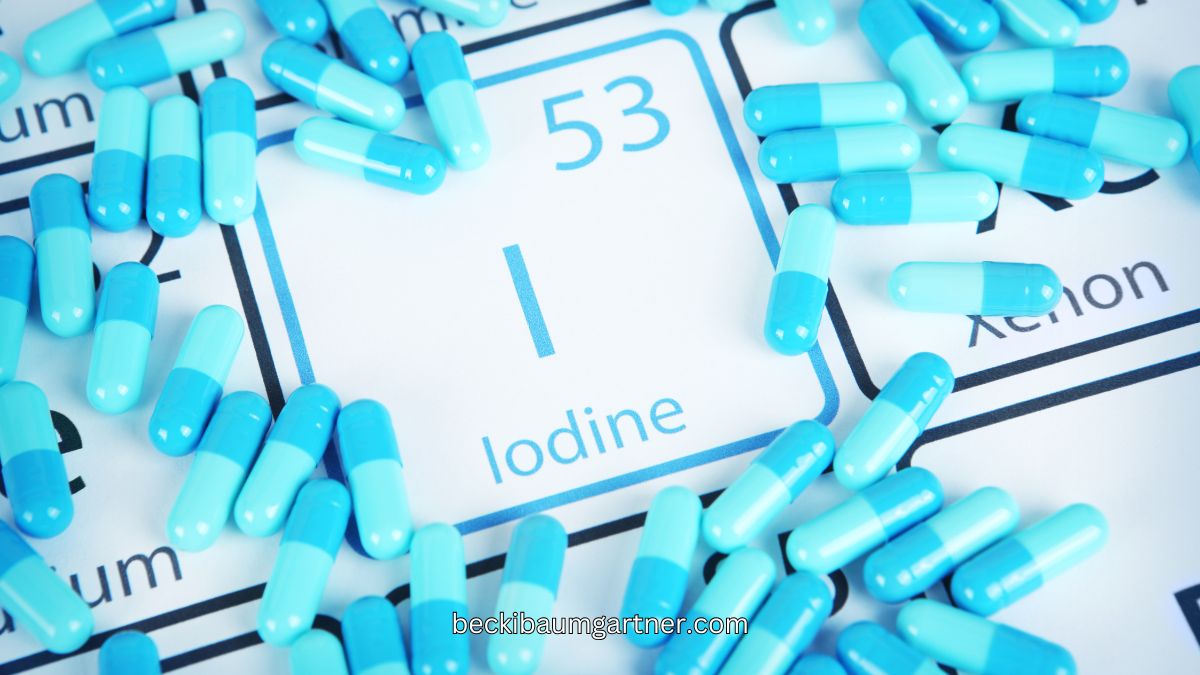Introduction
Background on Iodine
Iodine is a crucial trace element which is necessary for proper thyroid hormone production and overall cellular function. The thyroid gland relies heavily on iodine to produce thyroxine (T4) and triiodothyronine (T3), hormones that regulate metabolism, energy levels, and growth. Historically, iodine has been used in medicine since the early 19th century when Jean Francois Coindet first identified its ability to treat goiter, a condition caused by an enlarged thyroid gland due to iodine deficiency.1 During the 20th century, introducing iodized salt significantly reduced the prevalence of goiter and other iodine-deficiency disorders in many parts of the world.
However, despite efforts to increase iodine intake, iodine deficiency remains a widespread issue, affecting an estimated one-third of the global population.1 Iodine is found in relatively small amounts in the earth’s crust, with the highest concentrations near coastal areas. Inland regions, especially those far from oceans, have iodine-deficient soil, leading to inadequate iodine levels in food grown in these areas. Modern farming techniques, poor soil management, and reduced iodine content in foods have exacerbated this problem, contributing to a resurgence of iodine deficiency across many populations.
Chronic Conditions and Iodine
Iodine deficiency is now recognized as a contributor to a wide range of chronic health conditions. The most well-known condition linked to iodine deficiency is hypothyroidism, in which the thyroid gland cannot produce sufficient thyroid hormones. This can lead to symptoms such as persistent fatigue, unexplained weight gain, hair loss, and depression1. Iodine deficiency is also associated with fibrocystic breast disease, an often painful condition characterized by non-cancerous breast lumps. Research shows that adequate iodine intake can alleviate these symptoms and reduce the risk of developing breast cancer.1
Moreover, iodine plays a vital role in protecting the body against toxic halides such as bromide, fluoride, and chlorine, which compete with iodine for absorption in the body and can further exacerbate iodine deficiency. This deficiency has been linked to autoimmune thyroid disorders, including Hashimoto’s thyroiditis, as well as other hormonal imbalances. Additionally, iodine’s role in cognitive function and detoxification and its potent antibacterial and antiviral properties make it a powerful tool for improving overall health.1
In the United States, iodine levels have dropped by more than 50% over the last several decades1, and this trend has led to an increase in iodine-related disorders, particularly among women of childbearing age. The widespread deficiency has significantly impacted thyroid health, hormonal balance, immune function, and overall well-being, emphasizing the need for effective iodine supplementation strategies.
Purpose of the Study
This thesis explores the efficacy of oral iodine supplementation in managing and potentially reversing chronic conditions. It focuses on autoimmune thyroid disorders, such as Hashimoto’s disease, fibrocystic breast disease, chronic fatigue syndrome, and the detoxification from harmful halides like bromide and fluoride. By analyzing case studies and current research, this thesis will demonstrate how supplementing with iodine can improve the health outcomes of individuals suffering from these conditions and provide a natural, safe alternative to conventional treatments.
Chapter 1: Understanding Iodine Deficiency
Iodine Deficiency Epidemic
Iodine deficiency is a global public health problem, with an estimated one-third of the world’s population affected by insufficient iodine levels.1 The World Health Organization (WHO) identifies iodine deficiency as the leading cause of preventable intellectual disabilities worldwide. While introducing iodized salt in the 20th century initially helped reduce the prevalence of iodine deficiency in many parts of the world, recent trends show a concerning reversal. In developed countries like the United States, iodine levels have declined by over 50% in the past few decades.1
This sharp decline in iodine levels is particularly alarming for women of childbearing age, as iodine is essential for proper fetal brain development. In the U.S., more than 50% of pregnant women are iodine deficient, putting their children at risk of developmental disorders such as cretinism, lower IQ, and increased infant mortality.1 The WHO now estimates that approximately 72% of the world’s population is affected by iodine deficiency disorders.1 These staggering numbers highlight the need for renewed attention to iodine supplementation and public health strategies to address this deficiency.
Causes of Iodine Deficiency
Several factors contribute to the growing problem of iodine deficiency:
- Soil Depletion: Many regions of the world, notably those far from the ocean, have iodine-deficient soil. As iodine is naturally found in seawater and coastal environments, inland areas often have soil that lacks sufficient iodine. Crops grown in these regions are iodine-deficient, reducing the amount of iodine available in the food supply.1 Poor farming techniques and environmental factors like deforestation and erosion exacerbate this problem.
- Reduced Use of Iodized Salt: Despite the widespread introduction of iodized salt in the 1920s, many people now consume less iodized salt. Modern health trends encouraging low-sodium diets and alternative salts, such as sea salt or Himalayan salt, often not iodized, have contributed to a drop in iodine intake. Estimates suggest that fewer than 50% of people in the U.S. now use iodized salt.1
- Dietary Choices: Specific dietary practices can increase the risk of iodine deficiency. For example, vegan and vegetarian diets, which exclude iodine-rich seafood and dairy products, can lead to insufficient iodine intake. Similarly, diets high in bakery products made with brominated flour can contribute to iodine deficiency, as bromide competes with iodine for absorption.1
- Exposure to Toxic Halides: Chemicals like bromide, fluoride, and chlorine, commonly found in food, water, and environmental sources, interfere with the body’s ability to absorb and utilize iodine. These toxic halides compete with iodine at receptor sites in the body, further depleting iodine levels. Bromide, in particular, has been used in commercial bread-making as a dough conditioner, replacing iodine in many food products and exacerbating the problem.1
Symptoms of Iodine Deficiency
Iodine deficiency manifests through many symptoms due to its critical role in thyroid hormone production and overall health. Some of the most common symptoms include:
- Fatigue and Low Energy: Iodine deficiency often results in hypothyroidism, where the thyroid gland cannot produce adequate thyroid hormones. This can lead to chronic fatigue, sluggishness, and reduced stamina.1
- Brain Fog and Cognitive Issues: Iodine is essential for brain function, and deficiency can result in mental fog, difficulty concentrating, and memory issues. Severe iodine deficiency in pregnant women can result in intellectual disabilities and developmental delays in children.1
- Hormonal Imbalances: Since iodine is critical for the production of thyroid hormones, deficiency often results in hormonal imbalances, leading to symptoms such as irregular menstruation, infertility, and, in some cases, miscarriages.1
- Susceptibility to Chronic Diseases: Iodine deficiency has been linked to an increased risk of several chronic conditions, including fibrocystic breast disease, breast cancer, prostate cancer, and autoimmune thyroid disorders like Hashimoto’s thyroiditis.1 Additionally, iodine is involved in detoxification, helping to eliminate toxic substances like bromide and fluoride from the body. The body’s detoxification ability is compromised without sufficient iodine, increasing the risk of toxic buildup and associated chronic diseases.1
Chapter 2: The Role of Iodine in Thyroid and Hormonal Health
Iodine and Thyroid Function
Iodine plays a fundamental role in thyroid function. It is a critical component in producing thyroid hormones—triiodothyronine (T3) and thyroxine (T4). These hormones regulate metabolism, energy production, and many essential processes throughout the body. Without sufficient iodine, the thyroid gland cannot produce adequate amounts of these hormones, leading to a condition known as hypothyroidism.
Historically, iodine deficiency was a significant cause of goiter, a thyroid gland enlargement. Goiter was particularly common in regions with iodine-poor soil, such as the “Goiter Belt” in the Midwest United States. In the early 20th century, introducing iodized salt dramatically reduced the incidence of goiter in these regions. By adding iodine to salt, the government reduced the goiter rate from 40% to less than 0.5% in schoolchildren in Michigan by 1951.
Despite the success of iodized salt programs in reducing goiter, recent trends indicate a resurgence of iodine deficiency, particularly in developed countries. The decline in iodine levels in the U.S. population has been attributed to factors such as reduced consumption of iodized salt and changes in dietary habits.1 Modern health trends, including low-sodium diets and the increased use of specialty salts (such as sea salt, which is often not iodized), have led to a significant reduction in iodine intake.
Thyroid Autoimmune Diseases
Autoimmune thyroid diseases, such as Hashimoto’s thyroiditis and Graves’ disease, are among the most common autoimmune disorders worldwide. Iodine deficiency is strongly linked to these conditions, as the immune system mistakenly attacks the thyroid gland when it is unable to produce enough thyroid hormones.1
Hashimoto’s thyroiditis, in particular, is associated with low iodine levels. In Hashimoto’s, the body’s immune system damages the thyroid gland, leading to hypothyroidism. Studies have shown that iodine supplementation can help alleviate symptoms by improving thyroid hormone production and reducing inflammation in the thyroid gland. However, it is crucial to monitor iodine levels carefully, as excessive iodine intake may trigger or worsen autoimmune thyroid conditions in some individuals.
Hormonal Imbalances Beyond the Thyroid
Beyond its crucial role in thyroid health, iodine also plays a vital role in regulating other hormones, particularly those involved in reproductive health. Iodine is highly concentrated in the breasts, ovaries, and prostate, indicating its importance for reproductive function.
In women, iodine deficiency has been linked to conditions such as fibrocystic breast disease, ovarian cysts, and irregular menstrual cycles. Adequate iodine levels can help balance estrogen and progesterone levels, reducing the risk of these conditions. For example, iodine supplementation has been shown to alleviate the symptoms of fibrocystic breast disease, a condition characterized by painful, lumpy breasts that affects many women.1
Iodine also supports prostate health in men. Research has suggested that iodine deficiency may be linked to an increased risk of prostate cancer, as iodine helps detoxify harmful substances and supports hormonal balance.
Case Studies and Clinical Research
Several case studies have highlighted the profound impact of iodine supplementation on thyroid health. In “Iodine: Why You Need It, Why You Can’t Live Without It,” Dr. David Brownstein discusses the case of Kevin, a 31-year-old man who developed hypothyroidism and chronic fatigue after receiving a flu shot. Despite being on thyroid medication, Kevin continued to experience fatigue until he began supplementing with iodine. Within five weeks, Kevin reported a dramatic increase in his energy levels and overall well-being.1
Another case involved a 42-year-old man from Michigan who had been diagnosed with hypothyroidism and was taking thyroid medication. After testing revealed severe iodine deficiency, he began supplementing with an iodine/iodide combination. His energy levels improved dramatically, and after three months, his iodine levels returned to a healthy range.1
Chapter 3: Iodine and Chronic Fatigue, Fibromyalgia, and Mental Clarity
Chronic Fatigue and Fibromyalgia
Iodine deficiency plays a significant role in chronic fatigue and fibromyalgia, both of which are characterized by persistent fatigue, pain, and cognitive impairments. Iodine supports cellular energy production by enabling the thyroid to produce sufficient levels of thyroid hormones (T3 and T4). These hormones regulate metabolism and energy levels, making iodine essential for maintaining normal mitochondrial function, which powers cellular energy.1
In the book “Iodine: Why You Need It, Why You Can’t Live Without It,” Dr. David Brownstein recounts the case of John, a 58-year-old man diagnosed with fibromyalgia. John experienced severe fatigue and body aches, yet thyroid medications did not resolve his symptoms. After testing, John was found deficient in iodine and was prescribed 75 mg of iodine daily with a complete nutritional program. Despite initial improvement, John’s symptoms only fully resolved after introducing vitamins B2 and B3, which enhanced his body’s ability to utilize iodine effectively. He described the transformation as miraculous, regaining his energy and clarity.1
Mental Clarity and Cognitive Function
Iodine is not only crucial for physical energy but also for cognitive function. Adequate iodine levels are critical for brain health, supporting mental clarity, memory, and concentration. Iodine is highly concentrated in brain tissues, particularly in areas like the substantia nigra, which are associated with neurodegenerative diseases.1 Iodine deficiency can lead to cognitive issues such as brain fog, poor focus, and slower mental processing.
In “The Iodine Crisis,” Marty, a 31-year-old man, experienced crippling fatigue and brain fog beginning in his teenage years. After years of unhelpful treatments, Marty discovered that iodine supplementation could resolve his symptoms. He started taking Lugol’s iodine solution and, within weeks, noticed a significant improvement in his energy and cognitive function. He described this experience as transformative, allowing him to participate in activities he hadn’t been able to do in years.2
Another case from “Iodine: Why You Need It, Why You Can’t Live Without It“ involves Steven, a 55-year-old photographer, who experienced declining cognitive function, losing the creative abilities vital to his profession. After being diagnosed with low thyroid function and iodine deficiency, Steven began iodine supplementation. His mental clarity and creativity returned within two months, and his overall cognitive performance dramatically improved.1
The Role of Iodine in Neurological Health
Research has also indicated that iodine deficiency is linked to several neurological conditions. Since iodine is required for the development and function of the nervous system, deficiencies during critical periods of brain development can lead to lasting cognitive deficits. In adults, insufficient iodine levels may contribute to mental decline, depression, and difficulty concentrating.
Iodine supplementation has also been shown to help individuals with conditions such as depression and anxiety. By addressing the root cause—low thyroid function—iodine can alleviate mood disorders that are often misdiagnosed and treated with antidepressants rather than addressing the underlying iodine deficiency.1
Chapter 4: Iodine and Cancer Prevention
Breast Cancer and Fibrocystic Breast Disease
One of the most significant connections between iodine deficiency and chronic disease is its role in breast health. Iodine is crucial for maintaining the structural integrity of breast tissue and protecting against hormonal imbalances. Research has shown that iodine deficiency can lead to conditions. One of them is fibrocystic breast disease, a painful condition where lumps develop in the breast tissue, increasing the risk of breast cancer. Women who consume adequate levels of iodine, such as those in Japan, show significantly lower rates of fibrocystic breast disease and breast cancer compared to populations with lower iodine intake.1
In clinical studies, women with fibrocystic breast disease who were supplemented with iodine reported significant improvements. Over 50% of women experienced reduced symptoms such as pain and breast lump size after six months of iodine supplementation.1 Furthermore, iodine supplementation has normalized breast tissue structure, particularly in iodine-deficient individuals. This suggests that correcting iodine deficiency can help reverse fibrocystic changes and reduce breast cancer risk.1
Research has also demonstrated that iodine protects against breast cancer. It helps regulate estrogen receptors, reducing the harmful effects of excess estrogen in breast tissue. Additionally, iodine promotes apoptosis (programmed cell death) in malignant cells, further reducing cancer progression.1
Prostate and Ovarian Cancer
Like breast tissue, the ovaries and prostate store significant amounts of iodine. Iodine regulates estrogen production in women and testosterone balance in men. An iodine-deficient state in these organs increases the risk of developing hormonally driven cancers, including ovarian and prostate cancers.
Japanese populations, known for their high iodine intake through seaweed, show lower rates of prostate and ovarian cancer than Western populations. Research suggests that iodine’s protective effects may extend to preventing and treating these cancers.1 In rat studies, adding iodine to chemically induced tumors in the breast and prostate significantly slowed tumor growth and reduced cancer progression.1
The Role of Iodine in Detoxification and Cancer Prevention
Iodine also plays a crucial role in detoxification, particularly in protecting the body from harmful halides such as bromide and fluoride, often present in processed foods, water, and certain medications. These toxic halides compete with iodine for absorption in the body, exacerbating iodine deficiency and increasing the risk of cancer development.1
Several studies have found that individuals with breast cancer tend to have higher levels of toxic halides, such as bromide and fluoride, than those without cancer. In an iodine-deficient state, the body’s ability to detoxify from these harmful substances is reduced, which may contribute to the rising cancer rates in iodine-deficient populations.1
Case Studies and Clinical Research
Numerous case studies highlight iodine’s protective role in cancer prevention and treatment. Joan, a 60-year-old woman diagnosed with breast cancer, began iodine supplementation after conventional therapies were ineffective. Over six weeks, her iodine dosage was gradually increased, leading to tumor disintegration and improved overall health.1 Other patients have experienced similar outcomes, including reductions in thyroid nodules, ovarian cysts, and prostate tumors when treated with iodine supplementation.
Chapter 5: Detoxification and Iodine’s Role in Eliminating Toxic Halides
Toxic Halides (Bromide, Fluoride, and Chlorine)
The modern environment exposes individuals to toxic halides, including bromide, fluoride, and chlorine, prevalent in everyday items such as water, food, medications, and consumer goods. These halides compete with iodine for receptor sites in the body, particularly in the thyroid gland. Bromide, for example, binds to iodine receptors, preventing iodine from being absorbed properly and hindering thyroid hormone production.1
Bromine toxicity, or bromism, can result in a range of adverse health effects, including fatigue, brain fog, depression, and even severe neurological symptoms such as delirium and psychomotor retardation.1 Fluoride, added to drinking water and dental products, further exacerbates iodine deficiency by inhibiting the thyroid’s ability to absorb iodine. Chlorine, often used in water treatment, also contributes to the burden on the body by displacing iodine.1
Detoxifying with Iodine
Iodine supplementation is crucial in detoxifying the body from these toxic halides. By increasing iodine intake, the body can more effectively eliminate halides like bromide and fluoride through a process known as competitive inhibition. This allows iodine to displace the toxic halides from receptor sites, enabling the body to excrete them. Bromide, for instance, is excreted through the kidneys, while fluoride is flushed out through urine.1
Clinical research has shown that iodine supplementation leads to a marked increase in the excretion of toxic halides. In a study involving iodine-deficient individuals, bromide levels in the urine increased significantly after iodine supplementation, demonstrating the body’s ability to detoxify once iodine levels were restored.1
Steps to Support Detoxification
Several steps are recommended to support the detoxification process when supplementing with iodine:
- Adequate Hydration: Drinking sufficient water is essential for flushing out toxins from the body. It is recommended to drink half of your body weight in ounces of clean, fluoride-free water daily to facilitate the detoxification process.1
- Unrefined Salt: Ingesting unrefined salt, such as Celtic Sea Salt®, can help eliminate bromide from the body by providing chloride, which competes with bromide for absorption.1 Chloride helps to displace bromide and facilitates its excretion, reducing bromine toxicity.
- Antioxidant Support: Antioxidants, such as vitamin C and selenium, protect the body from oxidative stress during detoxification. Vitamin C helps detoxify fat-soluble tissues, while selenium supports thyroid function and improves overall antioxidant status.1
- Iodine Supplementation: To achieve effective detoxification, iodine supplementation must be at sufficient levels—typically in the range of 12-50 mg per day. Higher doses may be required for individuals with severe iodine deficiency or those suffering from chronic illnesses such as breast cancer or prostate cancer.1
Case Studies and Clinical Research
Several case studies support the efficacy of iodine supplementation in detoxifying the body and improving overall health. For example, Betty, a patient diagnosed with bromide toxicity, was treated with 50 mg of iodine/iodide daily, along with vitamin C, unrefined salt, and magnesium. After two months of treatment, she experienced improved energy levels, reduced brain fog, and a reduction in the size of her thyroid nodules.1
In another case, a 35-year-old man suffering from chronic fatigue and depression was found to have high levels of bromide. After starting iodine supplementation, his energy levels increased, and his mood improved, demonstrating the powerful detoxifying effects of iodine.1
Chapter 6: Dosage Guidelines, Testing, and Safety Considerations
Iodine Dosage for Chronic Conditions
The optimal dosage of iodine varies depending on the individual’s health status and the severity of their iodine deficiency. The recommended dietary allowance (RDA) for iodine is 150 µg/day, which is sufficient to prevent goiter but inadequate for addressing chronic health conditions like hypothyroidism, fibrocystic breast disease, and certain cancers.1 Research indicates that individuals in Japan consume about 13.8 mg of iodine daily from seaweed, which correlates with lower rates of breast cancer, ovarian cancer, and fibrocystic breast disease.1
For individuals with chronic conditions or severe iodine deficiency, therapeutic doses of 12-50 mg/day of iodine (in the form of iodine/iodide combinations like Lugol’s solution or Iodoral®) are recommended. In some cases, patients may require higher doses, especially those with long-standing deficiencies, detoxification needs, or thyroid disorders.1 It is critical that any iodine supplementation be monitored by a healthcare provider, significantly when doses exceed the RDA.
Iodine Testing: Assessing Deficiency
Proper iodine testing is essential for determining whether supplementation is necessary and to monitor progress. There are several methods to evaluate iodine status:
- Iodine Loading Test: An iodine loading test is one of the most accurate ways to assess iodine deficiency. In this test, the patient takes a large dose of iodine (typically 50 mg), and iodine excretion is measured over 24 hours. Healthy individuals excrete more than 90% of the iodine. In contrast, those who are deficient will excrete less.1 This test provides a comprehensive view of the body’s iodine sufficiency and can guide dosage adjustments during supplementation.
- Urinary Iodine Test: A simpler, less invasive test involves measuring the concentration of iodine in a random or 24-hour urine sample. Low urinary iodine levels suggest deficiency, while elevated levels indicate adequate iodine intake. The WHO considers urinary iodine concentrations below 100 µg/L indicative of iodine deficiency.1
- Serum Iodine and Thyroid Function Tests: Measuring serum iodine levels can provide additional insight, though it is less commonly used. Thyroid function tests, such as TSH (thyroid-stimulating hormone), free T3, and free T4 levels, are also necessary when assessing iodine-related thyroid issues. In cases of deficiency, TSH levels often increase as the body attempts to stimulate the thyroid to produce more hormones.1
Monitoring and Safety Considerations
Regularly monitoring both iodine levels and thyroid function is crucial when starting iodine supplementation. An initial rise in TSH levels may occur as iodine reactivates the thyroid, a condition known as the “Wolff-Chaikoff effect.” This is usually transient, but continued monitoring of TSH, T3, and T4 levels ensures that the body is responding appropriately to iodine supplementation.1
To prevent detoxification reactions or over-stimulation of the thyroid, it is essential to:
- Start Slowly: Begin with a low dose of iodine and gradually increase it under a healthcare provider’s supervision. This allows the body to adjust and reduces the risk of adverse reactions.1
- Support Detoxification: Supplement with unrefined salt (Celtic Sea Salt®) and vitamin C to support the excretion of toxic halides like bromide and fluoride. These halides can block iodine absorption and cause detox symptoms such as headaches, fatigue, and skin eruptions.1
- Stay Hydrated: Drinking plenty of water is essential for flushing out toxins mobilized by iodine supplementation.1
Potential Side Effects
Though iodine is generally safe when taken in appropriate amounts, excessive iodine intake can lead to side effects, including:
- Iodism: This condition is characterized by symptoms such as metallic taste, increased salivation, and acne. These symptoms typically resolve when iodine intake is reduced.1
- Detox Reactions: As iodine mobilizes toxins, some people experience fatigue, muscle aches, headaches, and brain fog. These symptoms can be managed with salt loading and increased hydration.1
- Iodine-Induced Hyperthyroidism or Hypothyroidism: In some individuals, particularly those with pre-existing thyroid conditions, iodine supplementation may cause temporary thyroid imbalances. This is rare and usually resolves with dosage adjustments and ongoing monitoring.1
Case Studies and Clinical Observations
Numerous case studies illustrate the benefits of iodine supplementation and the importance of monitoring. For example, Steven, a photographer with hypothyroidism, experienced cognitive decline, low energy, and creative blocks. After being diagnosed with iodine deficiency and starting iodine supplementation (50 mg/day), he saw dramatic improvements in energy, mental clarity, and overall well-being. His iodine loading test improved from 23% excretion to 95% after sustained supplementation.1
Another case involves Betty, a patient with high levels of bromide and thyroid nodules. After beginning iodine supplementation and a detox regimen of unrefined salt and vitamin C, she saw significant improvements in her symptoms, including a reduction in the size of her thyroid nodules.1
Conclusion
Iodine is a vital trace element essential in maintaining overall health, particularly in thyroid function, hormonal balance, and detoxification. Despite being recognized for its importance over the last century, iodine deficiency remains a widespread global health issue, with significant consequences for individuals suffering from chronic conditions.
This thesis has demonstrated that oral iodine supplementation is not only effective in correcting iodine deficiency but also plays a critical role in managing and potentially reversing various chronic conditions, including hypothyroidism, fibrocystic breast disease, cancer, chronic fatigue, and autoimmune thyroid disorders. The re-emergence of iodine deficiency, particularly in developed countries, can be attributed to dietary changes, reduced use of iodized salt, and increased exposure to toxic halides like bromide, fluoride, and chlorine. These factors have contributed to a public health crisis that requires urgent attention.
Supplementing with iodine can restore thyroid function, reduce the risk of hormonally driven cancers, support breast health, and improve cognitive function and mental clarity. As explored in this thesis, clinical studies and case reports consistently highlight the profound benefits of iodine supplementation for individuals with chronic conditions. Many patients have experienced remarkable energy, mood, and overall health improvements by addressing the underlying deficiency.
Proper testing, including iodine loading tests and urinary iodine excretion tests, must be considered. These tools are essential for identifying iodine deficiency and guiding supplementation protocols. Furthermore, careful monitoring of iodine levels and thyroid function tests is necessary to ensure safe and effective treatment, especially in those with pre-existing thyroid conditions.
While iodine supplementation is generally safe when done correctly, it is critical to be aware of potential side effects such as detoxification reactions and temporary thyroid imbalances. These can be managed through gradual dosing, hydration, salt loading, and antioxidant support. For optimal results, individuals should work closely with healthcare providers knowledgeable in iodine therapy.
In conclusion, iodine supplementation represents a promising and natural approach to managing chronic conditions often driven by underlying iodine deficiency. Its ability to promote detoxification, balance hormones, and restore thyroid function underscores its importance in modern health care. Addressing the iodine deficiency epidemic through targeted supplementation could profoundly impact public health, reducing the prevalence of chronic diseases and improving the quality of life for millions of people worldwide.
Resources and References
Resources
The groups below provide platforms for individuals to connect, share experiences, and seek advice on iodine supplementation. Engaging with such communities can offer valuable support and information for those interested in exploring the benefits of iodine.
Iodine Workshop Facebook Group
The Iodine Workshop Facebook Group is a platform for individuals to share experiences, ask questions, and gain insights about iodine supplementation.
Iodine Support Group – Lugol’s Iodine
This Facebook group discusses Lugol’s iodine solution, a common form of iodine supplementation.
References
- Brownstein, D. (2008). Iodine: Why You Need It, Why You Can’t Live Without it. Mitchell Beazley.
- Farrow, L. (2013). The Iodine Crisis: What You Don’t Know about Iodine Can Wreck Your Life. DEVON Press.
- Pearce, E. N. (2017). Iodine deficiency disorders and their elimination. Springer.
- Venturi, S., & Venturi, M. (2009). Iodine – Bringing Back the Universal Medicine.





